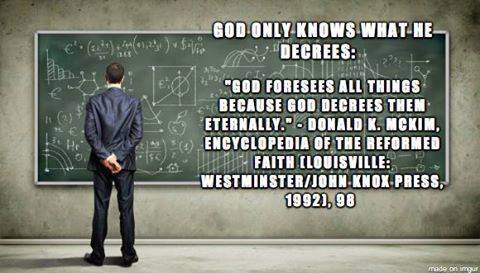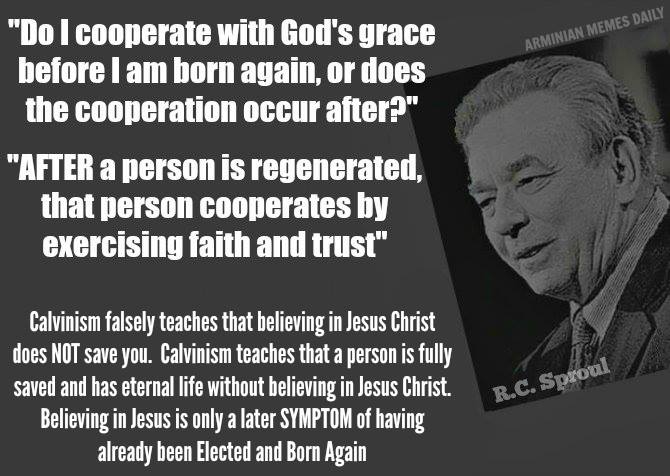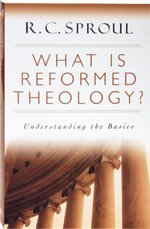R.C. Sproul
Calvinist, R.C. Sproul, writes: “The Reformed view of predestination teaches that before a person can choose Christ his heart must be changed. He must be born again.” (Chosen By God, p.72, emphasis mine)
This is the Calvinist teaching that a person must be born again before they can believe in the Gospel. Arminians believe that a person is made born again only after first turning to Christ, and
Sproul writes: “What predestination means, in its most elementary form, is that our final destination, heaven or hell, is decided by God not only before we get there, but before we are even born. It teaches that our ultimate destiny is in the hands of God. Another way of saying it is this: From all eternity, before we ever live, God decided to save some members of the human race and to let the rest of the human race perish. God made a choice--he chose some individuals to be saved unto everlasting blessedness in heaven and others he chose to pass over, to allow them to follow the consequences of their sins into eternal torment in hell.” (Chosen By God, p.22, emphasis mine)
However, Calvinists also teach that more than just final destinations are determined, but also “single events,” including “whatsoever comes to pass.”
Calvin writes: “This, however, they erroneously confine to particular acts. The thing to be proved, therefore, is, that single events are so regulated by God, and all events so proceed from his determinate counsel, that nothing happens fortuitously.” (The Institutes of Christian Religion, Book I, Ch. 16, Sect. 4, emphasis mine)
In other words, Arminans infer that predestination is whatsoever God does, and Calvinists disagree, by asserting that predestination means that God determines whatsoever comes to pass. In other words, to the Calvinist, predestination is not just what God does, but that God does everything. That is also called exhaustive Determinism, which Calvinists affirm, when they teach that there is a sovereign, immutable decree, by which all things are predetermined. This, however, also carries the charge of Fatalism.
The Calvinistic, Westminster Confession of Faith, states: “God from all eternity, did, by the most wise and holy counsel of His own will, freely, and unchangeably ordain whatsoever comes to pass; yet so, as thereby neither is God the author of sin, nor is violence offered to the will of the creatures; nor is the liberty or contingency of second causes taken away, but rather established. Although God knows whatsoever may or can come to pass upon all supposed conditions; yet has He not decreed anything because He foresaw it as future, or as that which would come to pass upon such conditions. By the decree of God, for the manifestation of His glory, some men and angels are predestinated unto everlasting life; and others foreordained to everlasting death.” (Westminster Confession of Faith, III. Of God’s Eternal Decree, emphasis mine)
In fact, some Calvinists teach that unless God had determined everything there ever could be, then God could not infallibly know what comes to pass:
Calvinist, James White, writes: “How God can know future events, for example, and yet not determine them, is an important point….” (Debating Calvinism, p.163, emphasis mine)
White writes: “How can God know what these free creatures will do in the future, if they are truly free (the argument open theists are aggressively promoting today)?” (Debating Calvinism, p.168, emphasis mine)
“How” could God know it?, asks White. For White, God must determine it, in order to know it. For White, omniscience is simply a matter of God knowing what He scripted, and since God scripted everything, according to White, then it follows that God must then know everything. That’s White’s logic. So the idea that Calvinists do not believe that everything is scripted, is simply a matter of not reading what Calvinists are saying.
Calvinist, R.C. Sproul, writes: “He knows all things will happen because he ordains everything that does happen. This is crucial to our understanding of God’s omniscience. He does not know what will happen by virtue of exceedingly good guesswork about future events. He knows it with certainty because he has decreed it.” (What Is Reformed Theology, p.172, emphasis mine)
Sproul adds: “The Westminster Confession avers: ‘God from all eternity, did, by the most wise and holy counsel of His own will, freely, and unchangeably ordain whatsoever comes to pass….’ This statement refers to God’s eternal and immutable decretive will. It applies to everything that happens. Does this mean that everything that happens is the will of God? Yes.” (What Is Reformed Theology, p.172, emphasis mine)
That is Calvinism.
R.C. Sproul states: “And so a being who has a desire to do something evil, before he chooses to do that evil, is already fallen before he makes the choice. Do you see that? That’s the point that so many people miss, when they say, ‘Oh well it all because of the free choice of Adam and Eve.’” [32:26]
But that’s just his assertion, and I don’t agree with it. He doesn’t seem to allow for a disagreement with his presupposition. Why didn’t he question his own assumption? For instance, simply being tempted to commit sin, is not sin. Jesus was tempted, but He didn’t sin. Jesus also genuinely desired to escape the Cross, both likely because of the suffering but more likely due to the separation from His Father, God. So by Sproul’s definition, Jesus is therefore “fallen,” simply for having the desire or temptation.
Perhaps Sproul is getting his concept from James 1:15: “Then when lust has conceived, it gives birth to sin; and when sin is accomplished, it brings forth death.”
Yes, lust gives birth to sin, but only when that lust is manifested in a sinful action, as it is not sin until the action is manifested. For instance, if the person turns back, then sin has not taken place. Moreover, if Sproul’s presupposition was true, then Eve didn’t fall when she ate of the fruit (compare with Genesis 2:16-17), but rather, according to Sproul’s logic, she fell in the moment that she headed out to check out the tree, and hence, if that is so, then Satan’s following line of questioning was superfluous and unnecessary, as her “fall” had already occurred. That’s the conclusion that Sproul would have to make, and it doesn’t appear that he had ever considered it. But God didn’t show up when Eve walked out to the tree, in order to pronounce judgment, but God only showed up after they both ate. So Sproul would ultimately have to conclude that God created fallen creatures, which Sproul knows is wrong, and thus Sproul didn’t think things out. God never said that in the moment that you “desire” to eat the fruit of the tree, you will surely die, but rather that when you actually eat of it (compare with Genesis 2:16-17), you should surely die. So Sproul clearly got it wrong, and never considered his own false assumption. In fact, by Sproul’s logic, the devil fell under God’s curse needlessly, as according to Sproul, she already fell, and the devil could have left without ever saying a word to her. Sproul, ultimately, has to reject that God made good creatures.
God willed to test free creatures so that by their choice, God may have fellowship with them. Choices are important to God, since fellowship is important to God.
The problem with Sproul is that he is too embarrassed to follow Calvinism to its logical extreme, and state what High Calvinists have been saying all along. For Sproul, since there is no wiggle room, he simply pleads ignorance.




